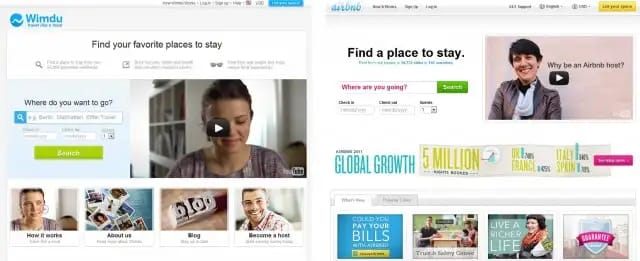- Entrepreneur Lore
- Posts
- How to beat a CopyCat (Like AirBnb)
How to beat a CopyCat (Like AirBnb)
The Samwer brothers couldn't get the best of these folks.

The year is 2011.
Airbnb is now three years old and growing exponentially.
People around the world, from the USA to Europe, Asia, and Australia, were loving the platform.
The startup was now worth $1.3 billion.
Everything was going well, but little did Brian Chesky and his team know that their biggest hurdle was waiting: a copycat.

Comparing both Wimdu and Airbnb (2011)
It wasn’t just any copycat; it was funded by one of the most prolific startup copycats in history, the Samwer Brothers.
They were so notorious that they raised $90 million, hired 400 people, and copied Airbnb’s every move—all within a span of 30 days. They tried everything to get Airbnb’s attention, but every attempt failed.
After seven years, Wimdu ceased operations in 2018, and Airbnb continues to thrive.
What happened between these two events? Let’s uncover it in this post.
Before we get to Wimdu vs. Airbnb, we need to understand the role of the Samwer Brothers here.

Marc, Oliver, and Alexander Samwer
The Samwer Brothers—Marc, Oliver, and Alexander—are German entrepreneurs who founded Rocket Internet, a prominent startup incubator. They gained notoriety for their "copycat strategy," which involved replicating successful U.S. business models in European and emerging markets. This approach included identifying growing American startups, copying their concepts for new regions, and rapidly scaling these clones through efficient execution.
They often sold these replicated companies back to the original firms or their competitors. Notable examples include Zalando, inspired by Zappos, and CityDeal, which was later acquired by Groupon. Through this strategy, the Samwer Brothers built a significant portfolio of successful companies and established themselves as key players in the European tech landscape.
Most importantly, they were making billions doing this.

eBay and Alando (their copy of eBay) side-by-side comparison
Their company Rocket Internet even went public in 2014 at a valuation of €6.7 billion (now delisted). Some of their most successful exits include selling Alando to eBay for $43 million in 1999, CityDeal to Groupon for $170 million in 2010, and taking Zalando public at a valuation of $6.8 billion in 2014.
At this point, most rising startups in the U.S. were afraid of them, but Airbnb didn’t see them as a threat. Brian Chesky, then CEO, knew that instead of panicking, they had to tackle the situation by simply continuing to do what they were doing. They just had to focus on why they started Airbnb and stick to originality.

Airbnb Co-Founders Brian Chesky (left), Joe Gebbia (center) and Nathan Blecharcyzk (right)
According to them, a company is not just made by numbers and stats; it’s made by the people who use its products.
If we were to break it down into eight reasons how they overcame this competition, they would be:
Established Brand: Airbnb’s strong reputation and loyal user base gave it a significant edge. Most people saw Wimdu as just a copy of them.
Innovation: Continuous new features and services kept Airbnb ahead.
Financial Strength: Significant funding allowed for heavy investment in marketing and global expansion.
User Experience: A user-friendly platform and reliable customer service enhanced overall satisfaction (which wasn’t the case with Wimdu).
Local Partnerships: Strategic local partnerships and market knowledge strengthened its presence.
Aggressive Marketing: Effective and sustained marketing efforts established a strong global footprint for AirBnb
Operational Efficiency: Better cost management and operational efficiencies supported sustainable growth.
(Most Important) Trust and Loyalty: Their focus on trust-building through reviews and support helped retain and attract users.
These are also the reasons why Airbnb became a household name by the mid-2010s.
“The picking process (where we figured out which businesses we’d clone) was not sophisticated. The barrier to entry was capital and execution. Community- or technology-focused companies wouldn’t do because it takes too much time and customer trust to make a lot of money. We tried cloning Airbnb, but it didn’t work because it’s so brand- and community-focused. Even though we had a staff of 400 in 15 offices within two months, it didn’t work.”
Brian Chesky knew it would eventually burn out because all Rocket Internet cared about was selling Wimdu to either Airbnb (as they had done in the past) or someone foolish enough to be impressed by their numbers. Neither happened.
In 2018, Wimdu eventually had to cease operations, firing almost 300 people and absorbing its business into HomeToGo (also owned by Rocket Internet).
The key takeaways here are to always remember why you started. Establish a strong brand, prioritize continuous innovation, and focus on delivering a superior user experience—these are your defenses against competition. The moment you give up and stop focusing on these things, anyone can dethrone you.
Don't worry about people stealing your design work.
Worry about the day they stop.
Also, don’t blatantly copy someone. There are many ways you can take inspiration from success around you, but being a mercenary rather than a missionary will always work against you.
Hope you liked this read.
Subscribe to get the next newsletter directly in your email.